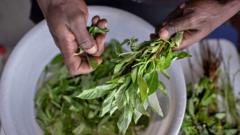Ngũgĩ wa Thiong'o, celebrated as a giant of African literature, died at the age of 87 after a remarkable life shaped by colonialism, imprisonment, and a relentless pursuit of justice through writing in native languages. With enduring works that reflect Kenya’s socio-political landscape, Ngũgĩ's contribution to literature will be missed amidst ongoing debates about language and identity on the continent. He leaves a significant impact, having inspired future generations of writers.
Ngũgĩ wa Thiong'o: A Legacy of Resistance in African Literature

Ngũgĩ wa Thiong'o: A Legacy of Resistance in African Literature
The influential Kenyan author, Ngũgĩ wa Thiong'o, passes away at 87, leaving behind a profound legacy and an unwavering commitment to native languages and social justice.
Ngũgĩ wa Thiong'o, who has died at the age of 87, was a titan of modern African literature - a storyteller who transcended challenges such as imprisonment, exile, and health struggles. Over a career spanning approximately six decades, he documented the evolution of Kenya from colonialism to democracy.
Often regarded as a potential Nobel Prize recipient, Ngũgĩ has left fans disappointed time and again as the accolade eluded him. He is remembered not just for his literary prowess, but also for his fervent advocacy for literature in African languages.
Born James Thiong’o Ngũgĩ in 1938 during British colonial rule, he grew up in Limuru, coming from a family of agrarian workers. His parents made financial sacrifices to ensure his education at a British-run boarding school. Upon returning home one term, Ngũgĩ found his village devastated by colonial forces, a formative experience that would fuel his writing.
In 1959, he left for Uganda to study at Makerere University. During a writers' conference, the esteemed Nigerian author Chinua Achebe endorsed his first manuscript, leading to the publication of "Weep Not, Child" in 1964, marking a critical moment as it was the first major English-language novel from East Africa. Ngũgĩ then published two more influential works, "A Grain of Wheat" and "The River Between," quickly solidifying his status as a leading literary voice.
However, 1977 brought seismic changes to his life. He adopted the name Ngũgĩ wa Thiong'o to release himself from colonial legacies, transitioning to writing exclusively in Kikuyu. His final English novel, "Petals of Blood," criticized the post-colonial elite and was met with government backlash culminating in his imprisonment for a year without trial. During this time, he wrote "Devil on the Cross" on toilet paper, highlighting the fierce creativity that characterized his resistance.
Following his release, Ngũgĩ faced threats to his life in Kenya, prompting a long self-imposed exile, spanning two decades. He taught at prestigious institutions in the US, advocating for literature in African tongues, challenging the prominence of English and French in African literary discourse as evidenced by his influential collection, "Decolonising the Mind."
His personal life contained its complexities, including two marriages and nine children, four of whom are also published authors. However, allegations by his son concerning domestic violence remain unresolved.
Ngũgĩ's health later declined, culminating in a triple bypass surgery in 2019 and battles with cancer. Despite these struggles, he continued to inspire through his work until his passing, a moment described by fellow Nigerian writer Chimamanda Ngozi Adichie as the loss of one of African literature's guiding lights. His contributions to literature and cultural discourse have left a rich legacy that will resonate for years to come.


















